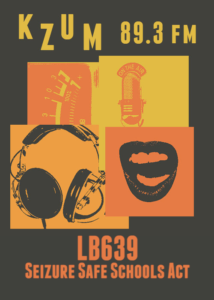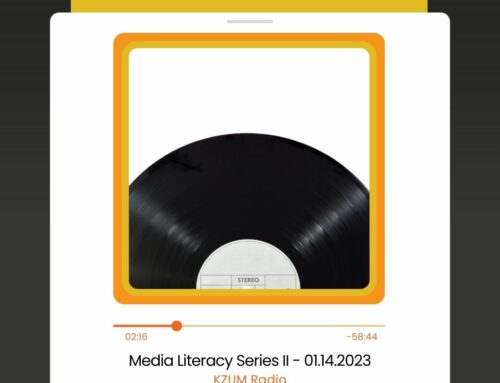By Juliet Bromme
April 23, 2021
There are thousands of children living with epilepsy in Nebraska. Recently, the Nebraska state legislature has been working on passing the Seizure Safe Schools Act which will protect students who experience seizures by providing education and training for school personnel. This important piece of legislation will provide policy that has not existed until this point.
 The bill, LB639, includes a plan to access emergency medication, where it will be located and who has access to it. Additionally, it will require one hour of self study training every two years for all certified school employees and a seizure action plan created with parents and medical professionals to help educators understand how to handle seizure situations.
The bill, LB639, includes a plan to access emergency medication, where it will be located and who has access to it. Additionally, it will require one hour of self study training every two years for all certified school employees and a seizure action plan created with parents and medical professionals to help educators understand how to handle seizure situations.
Senator Jen Day, who represents legislative district 49, decided to lead the charge on this bill after being made aware of its need from a constituent. Senator Day shared that a survey conducted state by state by CDC, found that 83% of educators don’t have any understanding of how to handle a seizure unless a parent of a child with epilepsy has specifically instructed them. One in 10 individuals, with children being the most at risk, will experience a seizure in their lifetime. A seizure is more common than most people think, so institutionalizing procedures to help educate and react in the situation that one arises, is crucial, Senator Day emphasizes.
“Time is of the essence when responding to seizures because literally seconds can determine quality of life for students in terms of potential of life-altering brain damage,” she says. Passing this bill would provide an effective response plan to these situations.
“It is important to us,” Senator Day says, “that all kids, especially kids with disabilities, are safe when they go to school everyday.”
Many nonprofit organizations advocate for legislation that will better the lives of individuals in their communities. Edison McDonald, executive director of The Arc of Nebraska explains that since their establishment 60 years ago, they have been at the forefront of the creation of disability advocacy movements.
 The Arc of Nebraska works regularly with senators to find pathways forward. “LB639 is a priority for us because we have so many family members and individuals who do have seizures and making sure that they have the support they need from trained staff in schools is tremendously important,” McDonald says.
The Arc of Nebraska works regularly with senators to find pathways forward. “LB639 is a priority for us because we have so many family members and individuals who do have seizures and making sure that they have the support they need from trained staff in schools is tremendously important,” McDonald says.
However, despite the support from senators, students with seizures and school staff, there still have been voices in opposition to the Seizure Safe Schools Act.
“I didn’t really expect that,” mentions McDonald when commenting on the challenges raised in the debate, “I just thought people would want to support people that have seizures and that have disabilities.”
“A lot of times folks don’t understand what’s going on… and always money [is an issue]. But, there isn’t going to be a high cost here.” However, the dedication organizations and legislators have put forth has provided the support the bill needs to get passed. The Seizure Safe Schools Act is currently at its final reading. After this action is complete, the only step left is for it to be signed by Governor Pete Ricketts.
Despite the work that The Arc of Nebraska has devoted to the Seizure Safe Schools Act, McDonald emphasizes that The Epilepsy Foundation and individuals who experience seizures are the ones who have taken charge both on a local and national level.
Jen and Ruby Cordes have worked closely with The Epilepsy Foundation to help provide education and awareness about epilepsy. Ruby, a high school sophomore who was first diagnosed with epilepsy at the age of 10, says that a seizure disorder is more common than many people think. “There are lots of misconceptions about people with epilepsy and I think it’s important for people to be more aware and for people who have epilepsy to have access to medications and seizure safe schools.” Education is an essential part of the bill. “Before I had it I had no idea what it was even, let alone how to handle it.”
Her mother, Jen, concurs. “Many people don’t know how to act when witnessing a seizure… Every time Ruby has a seizure we don’t need to call 911, but if it was somebody who didn’t know that, they might freak out and call 911 and she might end up in the ER when she didn’t have to.” Understanding the emergency situation would provide clarity for everyone involved.
For the past few years, Ruby has been involved with the Teens Speak Up! Conference in Washington, D.C., which brings together advocates like herself to speak to policy makers about epilepsy. This opportunity is also beneficial for Jen, who gets to meet parents who relate to and share her experience.
“Advocacy gives us a voice and something positive out of something that has been negative. And it connects us. There are so many other people that we find when we talk–we keep hearing about more and more people that have seizures, so it needs to be said and heard and spread,” Jen points out.
It takes courage to face situations that at times feel like they cannot be controlled. “It is an emotional topic,” says Jen. “It affects all of us. It affects the family, it affects the friends, it really does affect everybody.”
When Senator Day meets with family advocates like the Cordes’, she recognizes the dedication and grit needed in order to create legislative change. “I look them in the eye and say, yes this will help you. I think definitely meeting some of the families and seeing the passion they have for this bill and some of them even getting emotional and telling me what this means to them and how important it is to them–has been the biggest thing.”
There are thousands of children living with epilepsy in Nebraska. Recently, the Nebraska state legislature has been working on passing the Seizure Safe Schools Act which will protect students who experience seizures by providing education and training for school personnel. This important piece of legislation will provide policy that has not existed until this point.

The bill, LB639, includes a plan to access emergency medication, where it will be located and who has access to it. Additionally, it will require one hour of self study training every two years for all certified school employees and a seizure action plan created with parents and medical professionals to help educators understand how to handle seizure situations.
Senator Jen Day, who represents legislative district 49, decided to lead the charge on this bill after being made aware of its need from a constituent. Senator Day shared that a survey conducted state by state by CDC, found that 83% of educators don’t have any understanding of how to handle a seizure unless a parent of a child with epilepsy has specifically instructed them. One in 10 individuals, with children being the most at risk, will experience a seizure in their lifetime. A seizure is more common than most people think, so institutionalizing procedures to help educate and react in the situation that one arises, is crucial, Senator Day emphasizes.
“Time is of the essence when responding to seizures because literally seconds can determine quality of life for students in terms of potential of life-altering brain damage,” she says. Passing this bill would provide an effective response plan to these situations.
“It is important to us,” Senator Day says, “that all kids, especially kids with disabilities, are safe when they go to school everyday.”
Many nonprofit organizations advocate for legislation that will better the lives of individuals in their communities. Edison McDonald, executive director of The Arc of Nebraska explains that since their establishment 60 years ago, they have been at the forefront of the creation of disability advocacy movements.

The Arc of Nebraska works regularly with senators to find pathways forward. “LB639 is a priority for us because we have so many family members and individuals who do have seizures and making sure that they have the support they need from trained staff in schools is tremendously important,” McDonald says.
However, despite the support from senators, students with seizures and school staff, there still have been voices in opposition to the Seizure Safe Schools Act.
“I didn’t really expect that,” mentions McDonald when commenting on the challenges raised in the debate, “I just thought people would want to support people that have seizures and that have disabilities.”
“A lot of times folks don’t understand what’s going on… and always money [is an issue]. But, there isn’t going to be a high cost here.” However, the dedication organizations and legislators have put forth has provided the support the bill needs to get passed. The Seizure Safe Schools Act is currently at its final reading. After this action is complete, the only step left is for it to be signed by Governor Pete Ricketts.
Despite the work that The Arc of Nebraska has devoted to the Seizure Safe Schools Act, McDonald emphasizes that The Epilepsy Foundation and individuals who experience seizures are the ones who have taken charge both on a local and national level.
Jen and Ruby Cordes have worked closely with The Epilepsy Foundation to help provide education and awareness about epilepsy. Ruby, a high school sophomore who was first diagnosed with epilepsy at the age of 10, says that a seizure disorder is more common than many people think. “There are lots of misconceptions about people with epilepsy and I think it’s important for people to be more aware and for people who have epilepsy to have access to medications and seizure safe schools.” Education is an essential part of the bill. “Before I had it I had no idea what it was even, let alone how to handle it.”
Her mother, Jen, concurs. “Many people don’t know how to act when witnessing a seizure… Every time Ruby has a seizure we don’t need to call 911, but if it was somebody who didn’t know that, they might freak out and call 911 and she might end up in the ER when she didn’t have to.” Understanding the emergency situation would provide clarity for everyone involved.
For the past few years, Ruby has been involved with the Teens Speak Up! Conference in Washington, D.C., which brings together advocates like herself to speak to policy makers about epilepsy. This opportunity is also beneficial for Jen, who gets to meet parents who relate to and share her experience.
“Advocacy gives us a voice and something positive out of something that has been negative. And it connects us. There are so many other people that we find when we talk–we keep hearing about more and more people that have seizures, so it needs to be said and heard and spread,” Jen points out.
It takes courage to face situations that at times feel like they cannot be controlled. “It is an emotional topic,” says Jen. “It affects all of us. It affects the family, it affects the friends, it really does affect everybody.”
When Senator Day meets with family advocates like the Cordes’, she recognizes the dedication and grit needed in order to create legislative change. “I look them in the eye and say, yes this will help you. I think definitely meeting some of the families and seeing the passion they have for this bill and some of them even getting emotional and telling me what this means to them and how important it is to them–has been the biggest thing.”
Juliet Bromm is a journalism intern with KZUM.





